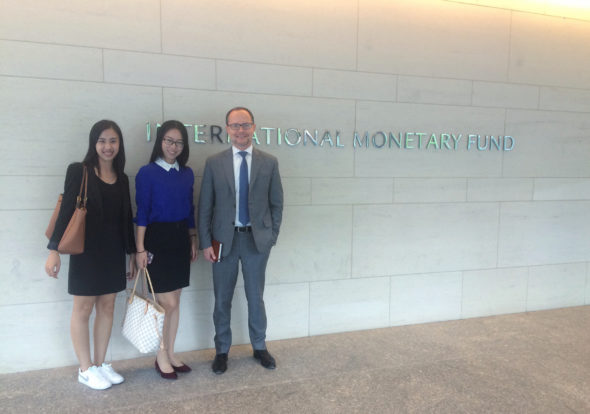We began Thursday in Washington, DC by giving a warm welcome to two attorneys from the Carlton Fields Jorden Burt law firm.
The first speaker gave us an overview of regulation and litigation in the financial services sector. He has extensive experience in federal and state securities, as well as insurance compliance and regulatory matters. He introduced the current financial service sectors and their relative sizes.
In the past 20 years, the US Congress has formulated Acts to regulate the market. The first speaker thought that financial entities prefer to deregulate to get more freedom, which results in regulatory tensions–such as the tensions between the Securities and Exchange Commission (SEC) and banks, insurance companies and Banks, and the SEC and Department of Labor (DOL).
Regarding regulation enforcement, there are three parts: inspection and investigation, whistle-blower, and civil or criminal penalties. Finally, the first speaker discussed market discipline, which consists of competition and litigation. To sum up, he introduced the regulation and litigation on financial markets to us in a simple but professional way.

The second speaker presented a short but high-level summary of litigation in financial services, with an emphasis on insurance. This speaker represents insurance companies and financial institutions in a range of complex litigation matters in state and federal courts. He pointed out that as investment products are becoming increasingly complicated, such as hedge funds and private equity, they are facing more litigation risk. He also mentioned concerns about companies making mistakes such as consolidation issues or providing information that is not very clear or extensive. Finally, he brought up the recent trends in Financial Technology (Fintech) and its regulations, which are functions of data they have in the marketplace.

Next, we were very pleased to have a speaker from Consumer Financial Protection Bureau (CFPB). First, the speaker gave us a brief introduction of CFPB.
It is a very young institution, established in 2011 as a result of the Dodd-Frank Act. The CFPB has consolidated separate financial consumer markets together to better help protect consumers’ interest, promote consumer financial education, and help businesses. One important component of the CFPB is supervision. The bureau reviews the performance of companies to determine their level of legal compliance. The CFPB will do a confidential investigation first, and then turn to public enforcement.
The speaker then shared some CFPB success stories, when fraudulent companies refunded the illegal profits to consumers and paid a large penalty. Last, the speaker introduced other aspects that the CFPB is working on, such as a consumer complaint process, which takes consumers’ complaints and reaches out to related firms to seek resolution. Furthermore, the CFPB is also devoted to consumer financial education. It believes financial well-being should include skills to make smart financial decisions, the capability to face financial shock, a basic degree of financial freedom, etc. Through posting resources online and building relationships with communities, the CFPB is expanding its impact and improving the financial market.

Next on the agenda was a site visit to the International Monetary Fund (IMF). Two officials from the public affairs department welcomed us. The presentation started with a clarification regarding the difference between World Bank and the IMF. For example, the IMF does not provide project financing, such as building a bridge in a developing area. The IMF ‘s global membership does not include the countries of Cuba, North Korea, Andorra, Monaco, and Liechtenstein. Then, the officer continued to talk about the voting shares and structure of the IMF. America owns the largest share in the IMF (16.5%); the other top shareholders also include China and Japan. Finally, new areas of focus for the IMF include inequality and inclusiveness, energy pricing, female labor force participation, and corruption. The speaker also emphasized the importance of males and females working together to resolve inequality between genders.
After returning from the IMF, we returned to the Brookings Institution, where our next speaker gave us an insightful and brilliant speech on financial stability oversight, the Dodd-Frank Act, and the role that the Federal Deposit Insurance Corporation (FDIC) plays in maintaining financial stability. In the speech, we learned the history of the FDIC  and the areas in which the FDIC focuses.
and the areas in which the FDIC focuses.
Created in 1933, the FDIC was established to preserve and promote public confidence in the US financial system. It aims to insure deposits for all US deposit banks, examine and supervise over 4,000 banks, and serve as a resolution authority and receiver for banks and systematically important financial institutions. We then gained an understanding of the contents and roles of the Resolution Plan and how it works. We were impressed with how complex and detailed the FDIC is with regulating banks and other financial institutions.
Guest Bloggers: Yumeng (Yolanda) Jiang, Yanyan Liu, Bo Sang, Zirui (Ernest) Wan, Lingyu Yang (GMF 2017)
This is a series of blogs chronicling the experiences of 42 Global Master of Finance (GMF) dual degree students during their two week immersion course in New York and Washington, DC. Each blog will be written by a small subset of students during their experience. Names of speakers and presenters at firms are anonymous at the request of the firms and course organizers.







